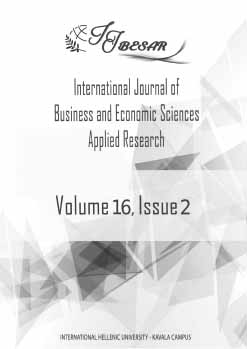Investors' Decision-making Under Risk: Evidence from the Croatian Stock Market
Investors' Decision-making Under Risk: Evidence from the Croatian Stock Market
Author(s): Danijel Petrović, Goran KaranovićSubject(s): Economy, Financial Markets
Published by: Τεχνολογικό Εκπαιδευτικό Ίδρυμα Ανατολικής Μακεδονίας και Θράκης
Keywords: Data Envelopment Analysis (DEA);stock market;investment strategy;Zagreb Stock Exchange;
Summary/Abstract: Purpose: This article deals with the retail investors’ decision-making under risk, firstly addressing several theories of decision-making under risk. Following this theoretical framework, an analysis on investment strategies on the Croatian capital market has been conducted. Design/methodology/approach: In this paper a non-parametric Data Envelopment Analysis (DEA) methodology is used to estimate input-oriented efficiency (minimization of risk i.e. stock return volatility, standard deviation) in retrospect to monthly stock returns of 15 selected stocks (due to a liquidity criteria) and five stock indices on the Croatian stock market in the period from 2016 until 2021. Findings: Results show that just but a few stocks provide high efficiency levels on the Croatian stock exchange, while the general CROBEX stock index proves to be a viable investment option for retail investors whose financial knowledge, expertise and time are limited. Research limitations/implications: This study was conducted on a limited sample of 15 most liquid stocks and five stock indices on the Croatian stock market in the period from 2016 until 2021. Due to the limited number of liquid stocks through time, the shallowness and illiquidity of the Croatian stock market provides a major limitation of this study. Furthermore, the limited sample attained dictated the use of nonparametric static DEA methodology that is suboptimal. For future studies, it is recommended to internationally expand the sample and use dynamic nonparametric and parametric techniques in stock efficiency estimation. Originality/value: The main aim of the study was to provide a theoretical overview on the theories of decision-making under risk. These theories provide insight that investors (retail but institutional nonetheless) are more loss avoidant than return seeking (risk aversion) which in the end affects their optimal investment strategy. In addition, this study used DEA methodology in efficiency estimation of 15 stocks on the Zagreb Stock Exchange (ZSE). The results from this study suggest that for untrained and inexperienced retail investor the investment in the general stock index could be a viable investment strategy. This study builds upon several studies on investment strategies on the Croatian stock market by providing more insight on stock and stock indices returns and efficiency several years previously and during the COVID-19 pandemic. Future studies dealing with similar topics should expand to a multinational sample that would solve the two main limitations of this study. Therefore, by expanding the sample to neighbouring countries, and increasing the number of liquid stocks observed and the possibility of using dynamic nonparametric and stochastic models in efficiency estimation of stocks to determine adequate investment strategies.
Journal: International Journal of Business and Economic Sciences Applied Research (IJBESAR)
- Issue Year: 16/2023
- Issue No: 2
- Page Range: 59-70
- Page Count: 12
- Language: English

